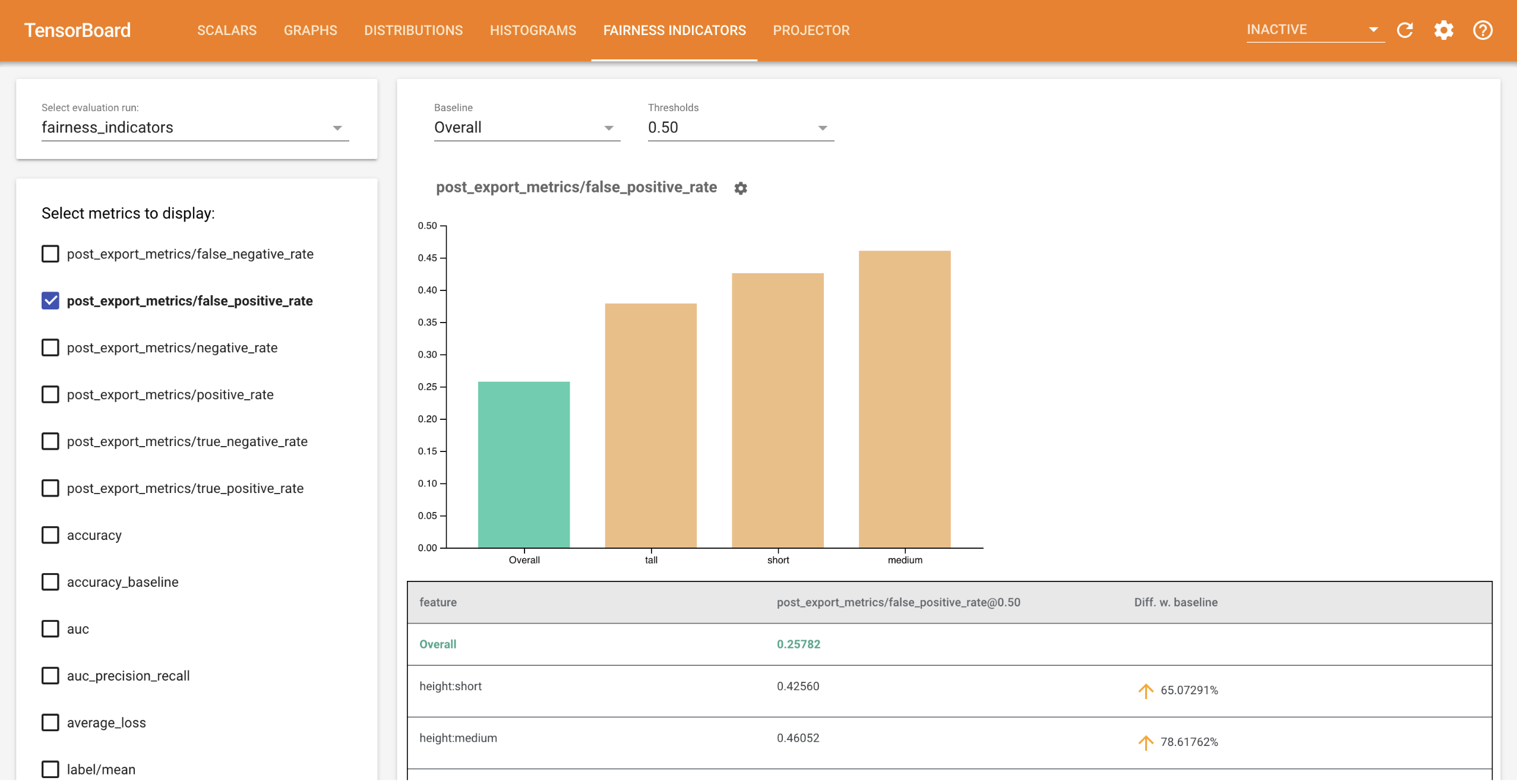Fairness Indicators for TensorBoard enables easy computation of commonly-identified fairness metrics for binary and multiclass classifiers. With the plugin, you can visualize fairness evaluations for your runs and easily compare performance across groups.
In particular, Fairness Indicators for TensorBoard allows you to evaluate and visualize model performance, sliced across defined groups of users. Feel confident about your results with confidence intervals and evaluations at multiple thresholds.
Many existing tools for evaluating fairness concerns don’t work well on large scale datasets and models. At Google, it is important for us to have tools that can work on billion-user systems. Fairness Indicators will allow you to evaluate across any size of use case, in the TensorBoard environment or in Colab.
To install Fairness Indicators for TensorBoard, run:
python3 -m virtualenv ~/tensorboard_demo
source ~/tensorboard_demo/bin/activate
pip install --upgrade pip
pip install fairness_indicators
pip install tensorboard-plugin-fairness-indicators
Tensorboard Plugin also hosts nightly packages at https://pypi-nightly.tensorflow.org on Google Cloud. To install the latest nightly package, please use the following command:
pip install -i https://pypi-nightly.tensorflow.org/simple tensorboard-plugin-fairness-indicatorsThis will install the nightly packages for the major dependencies of Tensorboard Plugin such as TensorFlow Model Analysis (TFMA).
Fairness_Indicators_TensorBoard_Plugin_Example_Colab.ipynb contains an end-to-end demo to train and evaluate a model and visualize fairness evaluation results in TensorBoard.
To use the Fairness Indicators with your own data and evaluations:
-
Train a new model and evaluate using
tensorflow_model_analysis.run_model_analysisortensorflow_model_analysis.ExtractEvaluateAndWriteResultAPI in model_eval_lib. For code snippets on how to do this, see the Fairness Indicators colab here. -
Write a summary data file using
demo.py, which will be read by TensorBoard to render the Fairness Indicators dashboard (See the TensorBoard tutorial for more information on summary data files).Flags to be used with the
demo.pyutility:--logdir: Directory where TensorBoard will write the summary--eval_result_output_dir: Directory containing evaluation results evaluated by TFMA
python demo.py --logdir=<logdir> --eval_result_output_dir=<eval_result_dir>`Or you can also use
tensorboard_plugin_fairness_indicators.summary_v2API to write the summary file.writer = tf.summary.create_file_writer(<logdir>) with writer.as_default(): summary_v2.FairnessIndicators(<eval_result_dir>, step=1) writer.close() -
Run TensorBoard
Note: This will start a local instance. After the local instance is started, a link will be displayed to the terminal. Open the link in your browser to view the Fairness Indicators dashboard.
tensorboard --logdir=<logdir>- Select the new evaluation run using the drop-down on the left side of the dashboard to visualize results.
The following table shows the package versions that are compatible with each other. This is determined by our testing framework, but other untested combinations may also work.
| tensorboard-pluginn | tensorflow | tensorflow-model-analysis |
|---|---|---|
| GitHub master | nightly (2.x) | 0.37.0 |
| v0.37.0 | 2.7.0 | 0.37.0 |
| v0.36.0 | 2.7.0 | 0.36.0 |
| v0.35.0 | 2.6.0 | 0.35.0 |
| v0.34.0 | 2.6.0 | 0.34.0 |
| v0.33.0 | 2.5.0 | 0.33.0 |
| v0.30.0 | 2.4.0 | 0.30.0 |
| v0.29.0 | 2.4.0 | 0.29.0 |
| v0.28.0 | 2.4.0 | 0.28.0 |
| v0.27.0 | 2.4.0 | 0.27.0 |
| v0.26.0 | 2.3.0 | 0.26.0 |
| v0.25.0 | 2.3.0 | 0.25.0 |
| v0.24.0 | 2.3.0 | 0.24.0 |
| v0.23.0 | 2.3.0 | 0.23.0 |
